Possible Side Effects After Getting a COVID-19 Vaccine
COVID-19 vaccination helps protect people from getting severely ill with COVID-19. Some people have side effects from the vaccine, which are normal signs that their body is building protection. These side effects may affect their ability to do daily activities, but they should go away in a few days. Some people have no side effects, and allergic reactions are rare.
Adverse effects that could cause a long-term health problem are extremely unusual following any vaccination, including COVID-19 vaccination. If adverse effects occur, they generally happen within six weeks of receiving a vaccine dose. For this reason, during clinical trials, the U.S. Food and Drug Administration (FDA) collected data on each of the authorized COVID-19 vaccines for a minimum of two months (eight weeks) after the final dose. CDC, FDA, and other federal agencies continue to monitor the safety of COVID-19 vaccines even now that the vaccines are in use.
COVID-19 vaccination helps protect people from getting severely ill with COVID-19. Some people have side effects from the vaccine, which are normal signs that their body is building protection. These side effects may affect their ability to do daily activities, but they should go away in a few days. Some people have no side effects, and allergic reactions are rare.
Adverse effects that could cause a long-term health problem are extremely unusual following any vaccination, including COVID-19 vaccination. If adverse effects occur, they generally happen within six weeks of receiving a vaccine dose. For this reason, during clinical trials, the U.S. Food and Drug Administration (FDA) collected data on each of the authorized COVID-19 vaccines for a minimum of two months (eight weeks) after the final dose. CDC, FDA, and other federal agencies continue to monitor the safety of COVID-19 vaccines even now that the vaccines are in use.
Common Side Effects
On the arm where you got the shot:
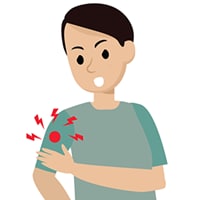
- Pain
- Redness
- Swelling

- Pain
- Redness
- Swelling
Throughout the rest of your body:
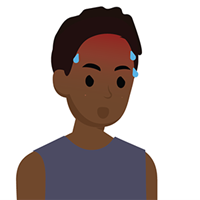
- Tiredness
- Headache
- Muscle pain
- Chills
- Fever
- Nausea
Severe allergic reactions after COVID-19 vaccination are rare. Anyone who had a severe allergic reaction after getting an mRNA COVID-19 vaccine (Pfizer-BioNTech or Moderna) should not get another dose of either of the mRNA COVID-19 vaccines. Anyone who had a severe allergic reaction after receiving Johnson & Johnson’s Janssen (J&J/Janssen) COVID-19 vaccine, should not receive another dose of that vaccine.
Learn about getting a different type of COVID-19 vaccine after an allergic reaction.

- Tiredness
- Headache
- Muscle pain
- Chills
- Fever
- Nausea
Severe allergic reactions after COVID-19 vaccination are rare. Anyone who had a severe allergic reaction after getting an mRNA COVID-19 vaccine (Pfizer-BioNTech or Moderna) should not get another dose of either of the mRNA COVID-19 vaccines. Anyone who had a severe allergic reaction after receiving Johnson & Johnson’s Janssen (J&J/Janssen) COVID-19 vaccine, should not receive another dose of that vaccine.
Learn about getting a different type of COVID-19 vaccine after an allergic reaction.
Helpful Tips to Relieve Side Effects
Talk to a doctor about taking over-the-counter medicine, such as ibuprofen, acetaminophen, aspirin (only for people ages 18 years or older), or antihistamines for any pain and discomfort experienced after getting vaccinated.
People can take these medications to relieve side effects after vaccination if they have no other medical reasons that prevent them from taking these medications normally. Ask your child’s healthcare provider for advice on using a non-aspirin pain reliever and other steps you can take at home to comfort your child after vaccination.
It is not recommended to take these medicines before vaccination for the purpose of trying to prevent side effects.
Talk to a doctor about taking over-the-counter medicine, such as ibuprofen, acetaminophen, aspirin (only for people ages 18 years or older), or antihistamines for any pain and discomfort experienced after getting vaccinated.
People can take these medications to relieve side effects after vaccination if they have no other medical reasons that prevent them from taking these medications normally. Ask your child’s healthcare provider for advice on using a non-aspirin pain reliever and other steps you can take at home to comfort your child after vaccination.
It is not recommended to take these medicines before vaccination for the purpose of trying to prevent side effects.
To reduce pain and discomfort where the shot is given
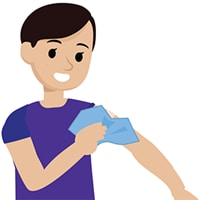
- Apply a clean, cool, wet washcloth over the area.
- Use or exercise your arm.

- Apply a clean, cool, wet washcloth over the area.
- Use or exercise your arm.
To reduce discomfort from fever
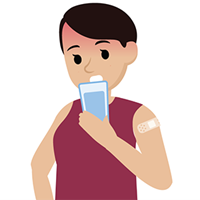
- Drink plenty of fluids.
- Dress lightly.

- Drink plenty of fluids.
- Dress lightly.
After a Second Shot or a Booster Shot
Side effects after the second shot may be more intense than the ones experienced after the first shot. These side effects are normal signs that the body is building protection and should go away within a few days.
So far, reactions reported after getting a booster shot are similar to those after the two-dose or single-dose primary shots. Fever, headache, fatigue, and pain at the injection site were the most commonly reported side effects, and overall, most side effects were mild to moderate. However, as with the two-dose or single-dose primary shots, serious side effects are rare but can occur.
Side effects after the second shot may be more intense than the ones experienced after the first shot. These side effects are normal signs that the body is building protection and should go away within a few days.
So far, reactions reported after getting a booster shot are similar to those after the two-dose or single-dose primary shots. Fever, headache, fatigue, and pain at the injection site were the most commonly reported side effects, and overall, most side effects were mild to moderate. However, as with the two-dose or single-dose primary shots, serious side effects are rare but can occur.
When to Call the Doctor
Side effects can affect you or your child’s ability to do daily activities, but they should go away in a few days.
In most cases, discomfort from pain or fever is a normal sign that the body is building protection. Contact a doctor or healthcare provider:
- If the redness or tenderness where the shot was given gets worse after 24 hours
- If the side effects are worrying or do not seem to be going away after a few days
If you or your child get a COVID-19 vaccine and you think you or they might be having a severe allergic reaction after leaving the vaccination site, seek immediate medical care by calling 911. Learn more about COVID-19 vaccines and rare severe allergic reactions.
Side effects can affect you or your child’s ability to do daily activities, but they should go away in a few days.
In most cases, discomfort from pain or fever is a normal sign that the body is building protection. Contact a doctor or healthcare provider:
- If the redness or tenderness where the shot was given gets worse after 24 hours
- If the side effects are worrying or do not seem to be going away after a few days
If you or your child get a COVID-19 vaccine and you think you or they might be having a severe allergic reaction after leaving the vaccination site, seek immediate medical care by calling 911. Learn more about COVID-19 vaccines and rare severe allergic reactions.
If You Have No Side Effects
Reactions after getting a COVID-19 vaccine can vary from person to person. Most people in clinical trials experienced only mild side effects, and some of them had no side effects at all. Those people still had a strong immune response to the vaccine. Vaccination protects you from severe COVID-19 infection whether or not you have side effects after vaccination.
Reactions after getting a COVID-19 vaccine can vary from person to person. Most people in clinical trials experienced only mild side effects, and some of them had no side effects at all. Those people still had a strong immune response to the vaccine. Vaccination protects you from severe COVID-19 infection whether or not you have side effects after vaccination.
Reporting Side Effects
V-safe provides quick and confidential health check-ins via text messages and web surveys so you can quickly and easily share with CDC how you or your dependent feel after getting a COVID-19 vaccine.
If you would like to report an adverse event, side effect, or reaction from the COVID-19 vaccine, please use the Vaccine Adverse Event Reporting System (VAERS). Learn more about VAERS.
V-safe provides quick and confidential health check-ins via text messages and web surveys so you can quickly and easily share with CDC how you or your dependent feel after getting a COVID-19 vaccine.
If you would like to report an adverse event, side effect, or reaction from the COVID-19 vaccine, please use the Vaccine Adverse Event Reporting System (VAERS). Learn more about VAERS.
What to Expect after Getting a COVID-19 Vaccine
Fact sheet for healthcare workers to give after vaccination.
File Details: 199 KB, 1 page
Fact sheet for healthcare workers to give after vaccination.
File Details: 199 KB, 1 page

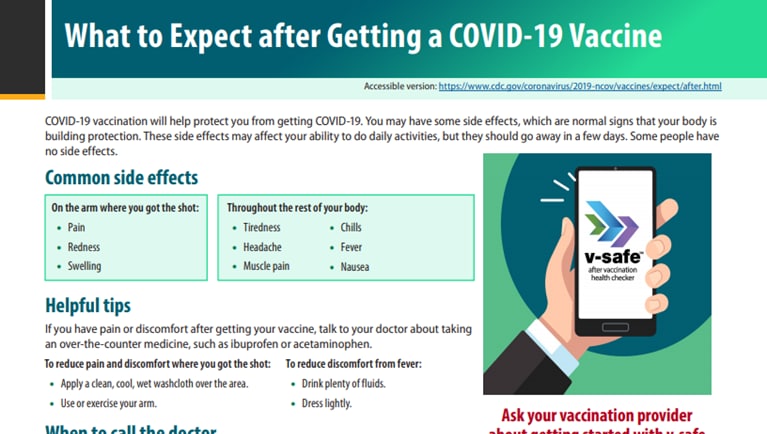
Comments
Post a Comment